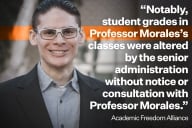You have /5 articles left.
Sign up for a free account or log in.
WASHINGTON -- President Obama has once again invited a group of college leaders to a meeting at the White House. But to participate in the confab next week attendees must make a new commitment aimed at helping lower-income students – and they have to submit those goals in writing.
Roughly 140 participants are expected to attend the full-day summit on Dec. 11, sources said. The invitation, copies of which Inside Higher Ed obtained, said attendees would include leaders from higher education, philanthropy, business and city and state governments.
The White House is being hush-hush about the meeting, the details of which are still taking shape. Invited participants were also unwilling to preempt the administration’s publicity push next week by going on the record about the commitments they planned to announce.
However, sources said the White House wants participants to set a goal in several general areas. They include improvements in remedial education success rates, increased enrollment of lower-income students or ramped-up student support services, such as hiring more counselors or improving the delivery of student advising. Also in the mix might be new student-success related partnerships across sectors, such as between four-year institutions, community colleges and high schools.
Colleges were asked to make commitments that included major improvements, preferably quantifiable ones. In written materials that accompanied the invitation, the White House described examples of “dramatic achievements” by colleges – such as double-digit increases in remedial course pass rates. Remediation is widely seen as one of the biggest barriers to improving college completion.
Another suggestion the White House has floated in the past is for colleges to pledge to substantially increase the percentage of Pell Grant-eligible students they enroll.
The administration sent the meeting’s invited participants a form to describe their proposed commitments. They were asked to submit responses in advance of the meeting. The White House plans to publicly highlight some of those goals, according to the invitation.
Challenge or Opportunity?
Higher education is a signature issue for Obama. For years he has prodded colleges on degree completion rates and the rising price of attending college. This new push adds a third leg to the stool by including student access as a priority, said Terry W. Hartle, the American Council on Education’s senior vice president for government and public affairs.
“Anytime the White House expresses an interest in increasing the percentage of underrepresented students in postsecondary education, it’s a big deal,” Hartle said. “This is a very important and desirable step.”
A White House spokesman declined to comment on the event, referring to previous statements by an administration official.
“We want to use this event as an opportunity to see how we can scale up the most successful approaches to helping students reach and succeed in college,” Jay Carney, a White House spokesman, told Yahoo News, which first reported on the Dec. 11 meeting.
President Obama referenced the event in a speech this week, saying he and the First Lady, Michelle Obama, were creating a “campaign to help more low-income students attend and succeed in college."
Sources said they expect the White House to seek similar commitments related to student access from other institutions in the future.
The administration’s National Economic Council and Domestic Policy Council are coordinating the meeting, along with the U.S. Department of Education, according to the invitation. Gene Sperling, the Domestic Policy Council’s director, appears to be playing a behind-the-scenes leadership role.
A group of college presidents are scheduled to join administration officials at a smaller event the night before the full meeting.
The White House has recently begun talking about the problem of “undermatching,” which refers to highly prepared students attending less selective colleges.
While experts say undermatching is a concern, one of the meeting’s invitees said it is far less important than boosting graduation rates at open-access institutions or controlling college costs. And others worry privately that the administration is at times too focused on elite colleges.
However, many higher education leaders have applauded the White House for its vocal interest in community colleges. And some said the administration’s attention to higher education may be unprecedented, at least in recent history.
The lower-income student success push joins several ongoing White House-proposed higher education initiatives. They include the college ratings plan, gainful employment regulations, the college completion goal and efforts to encourage competency-based education and other emerging online models of higher education.
President Obama is personally interested in college completion and cost. And he has probably summoned more college chiefs to his house than any other president.
This meeting, however, promises to be more specific and focused than others, sources said.
“I assume that the White House is in this for the long haul,” said Hartle. “This is a once-in-a-decade opportunity.”







